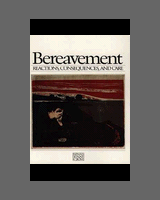From: CHAPTER 6, Toward a Biology of Grieving

Bereavement: Reactions, Consequences, and Care.
Institute of Medicine (US) Committee for the Study of Health Consequences of the Stress of Bereavement; Osterweis M, Solomon F, Green M, editors.
Washington (DC): National Academies Press (US); 1984.
Copyright © 1984 by the National Academy of Sciences.
NCBI Bookshelf. A service of the National Library of Medicine, National Institutes of Health.